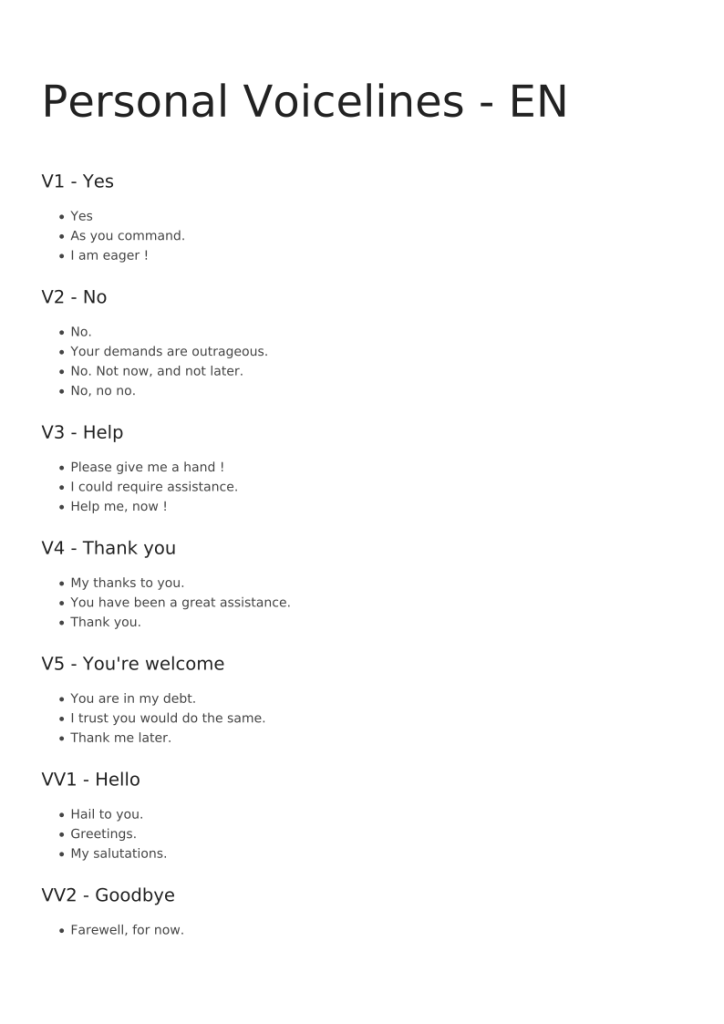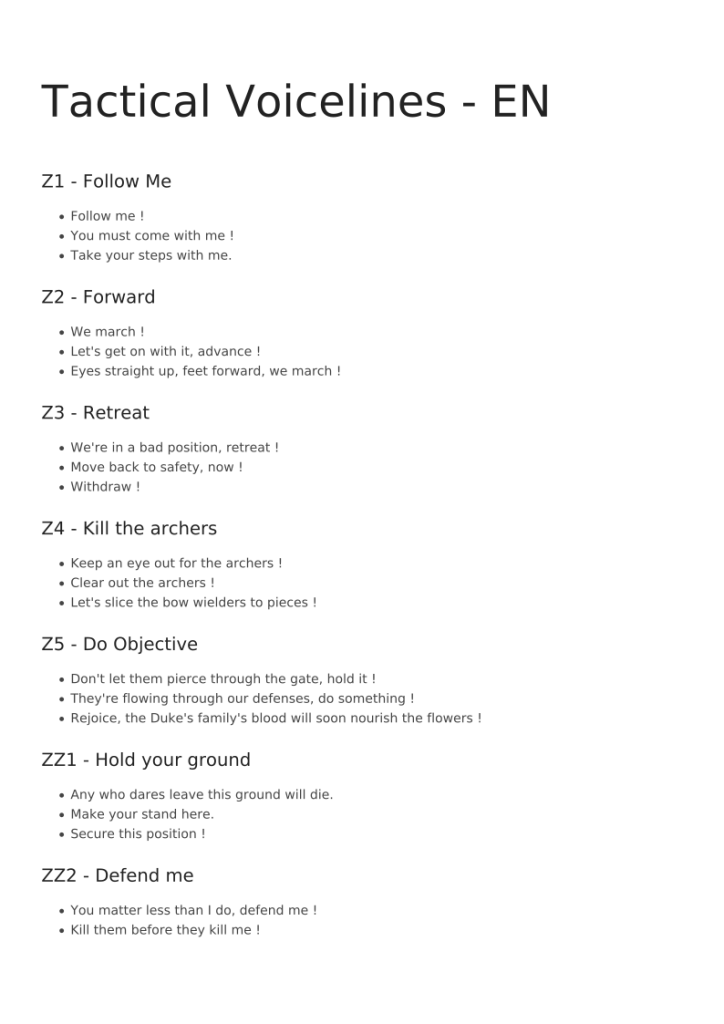Casting call
Casting call for a medieval first- and third-person video game for PC and Consoles.
Description
You will be interpreting a medieval warrior on a battlefield. The individual profile will vary: from the complexity of the words varying between men-at-arms and knighted individuals, to the fear evoked and even the sadistic aspect of warfare.
Your voice will be used as a “voice pack” of this videogame. When players make a character, they must choose a voice among a list of many to represent their character in game. With your voices, they will perform “callouts”, such as saying varying forms of “Yes” and “No”, to more complex voicelines such as Insults and Objective-related voicelines.
There is no exchange or conversation. The dialogue is one-sided, like a radio operator in theater warfare. Nonetheless, voiceline callouts include ways to respond to someone else’s voicelines. However, these are not “interactive”; they are not linked.
You will be performing the same voice pack twice, once in English, and once in a foreign language: Corsican. A phonetic understanding of Corsican will be provided to you as well beforehand as well as during your live performance with our casting director, Yago Durán – if you are located near Galicia, Spain.
Every voice pack has some individuality to it, but all voice packs must respect a tempo that is imperative and fast. In battle, one can die within a few seconds – there is no time to be lost in long vowels or spacing out words.
The tone can be best summarized as: militaristic, imperative, fast (150WPM or higher), but still human.
You will be performing three categories of sounds:
- Personal Voicelines (EN & CO): these represent voice lines that respond to other personal or tactical voicelines, or are meant to add context by the player. These can be spoken in a more normal but still relatively fast tone, highlighting the overall anima of the character.
- Tactical Voicelines (EN & CO): these represent voice lines indicating orders or giving out information to others. These have the fastest tempo, as there is a sense of urgency. These have the least personality, except in the content of the lines itself.
- Indirect Voicelines (Wordless): these sounds represent how one interacts with the world; effort (performing an attack), pain (receiving an attack, dying) and laughter.
Specific guidelines and an exhaustive description of all sub-categories will be given to you if you are contacted by us after sending us your reel and interpretation.
Personas
Renhir2 – Man, 40-45 years old: an experienced field officer, with two decades of warfare under him. He talks in short bursts, always to the point. He does not bother adding words that don’t add relevant information to the sentence. His career as a professional soldier should not assume undying loyalty to the idea of the Realm he has fought for – His care and loyalty are to his Maniple, his unit, which he sees as his “field family”. Outspoken, direct, and passionless, nonetheless he will quickly peer into brief moments of rage when troops under his command are in grave danger. He is ready to accept his death, whenever it may come, and doesn’t fear it. In one sentence, this persona represents. “The one who knows how to die, knows how to win”.
References:
- Mike Ehrmantraut, Breaking Bad
- The Punisher, Marvel Cinematic Universe
- Samurai Jack (Last Season)
Renhir3 – Man, 20-25 years old: a stark contrast to the above persona. Relatively young, with a couple years of experience as a professional soldier. Emotion can be felt in his words depending on the context, as many situations are still novel to this recruit. Unexpected victories, or moments of fear, can be perceived in this voice. He takes risks, and wants to show what he is worth to others his senior. He possesses a passion for the military, in both logistics and fencing, and wants to achieve it – Nonetheless, he is quite stubborn and insubordinate, which makes his goal harder to achieve.
References:
- Henry of Skalitz, Kingdom Come Deliverance
- Frodo Baggins, Lord of the Rings
- Luke Skywalker, Star Wars
Renhir4 – Man, 50 years old: seen by other troops as a mentor, as one should fear the old in a profession where one dies young. While he is seen as a mentor, he doesn’t want to be one. His voice tends towards a sad, depressive tone – monotonous. He has internalized the horrors of war and obeys what he is told to do, without fervor. He seeks the end of his service, but at the same time he is afraid of the life that awaits him after his boot walks the last step.
References:
- Sir Barristan Selmy, A Song of Ice and Fire / Game of Thrones
- Vesemir, The Witcher
Renhir5 – Man, 35 years old: at the peak of his physical ability and in-between being a paragon of warfare and a leader, this man is torn between two worlds. Between the love of the art of swordsmanship, a trait very present in Renhirite culture, and the vociferation of his duty towards the Realm by accepting a position where he will be of larger value. This character represents the sacrifice of the self for the benefit of the many. He sounds passionate, eager to help and positive, while able to switch to a very commanding tone whenever needed.
References:
- King Aragorn, Lord of the Rings
- Emperor Karl Franz, Warhammer Fantasy
- Vega, Street Fighter
- Felix, Warhammer Fantasy
Modifiers
Note: Modifiers are not currently implemented in game and, for cost reasons, will not be recorded yet.
The game has a few modifiers to trigger different voicelines depending on the state of the gameplay:
- Base modifier: This is the default tone that a character has. It represents talking in a normal, regular manner. Think of the volume you have if you were talking at a bar to someone who is about one table away from you. The ambient isn’t noisy, but it’s not exactly quiet either. In this scene, one could be reading a newspaper without feeling distraught by the noise.
- Battle modifier: Dependent on amount of enemies in radius and amount of attacks in radius. Makes the player talk louder.
- Out-of-breath modifier: Dependent on current stamina level. Makes the player sound out-of-breath, such as after running uphill.
- Wounded modifier: Dependent on amount of health. Makes the player sound in pain when he talks.
- Quiet modifier: Triggers if the character has been crouching for more than X seconds. The character is almost whispering.
Good Reference
Why ?
The tempo is fast, the instructions are clear, the English is intelligible.
Each class sounds different, while not being comical. However, it sounds a bit too theatrical.
There is a high level of post-edition, which is due to the fact most of Chivalry 1’s 8 classes were voiced by the same actor (Ryan Buckley).
Bad Reference
Why ?
The tempo has too much variety between voicelines, and is on average slightly too slow – with a few outliers.
If you close your eyes, it is difficult to imagine hearing this in the middle of a heated medieval battlefield or duel. The tone is very colloquial and hardly imperative.
However, the voice actress did overall quite a fantastic job of sounding sometimes very angry and imperative; but the overall direction for the pack was one that is too different from ours (theirs being a more comical caricature, versus our fictional cultural realism).
Good Reference
Why ?
The tempo is what is needed, the tone is very militaristic.
Emotions are shown in some situations while keeping the overall basal tone. Some modifiers similar to our project can be heard.
Good Reference
Why ?
While keeping a fast speed and a militaristic tone, the man’s intentions and emotion can be appreciated.
The lines, despite their rather large length, do not feel long with the tempo. Pauses, when they occur, aren’t too long – Long pauses can indicate to the player that a new voiceline is playing, which we want to avoid.
Our Own References - Sulma1
Our Own References - Renhir2
Trying out the lines
We encourage you to try different voices if your vocal range allows you to. If you do so, you may simply join your voice-types in a single file for best comparison.
Here’s an example:
Parting notes
Strategy games have potentially some of the best voicelines in the industry for our purposes.
We encourage you to explore different titles if you believe that will be useful to your performance; likewise, we encourage you to watch gameplay videos of these games to experience how the voicelines play in the greater soundscape (with ambient sound, music, combat sounds, etc):
- Chivalry 1 & 2
- Vermintide 1 & 2
- Dawn of War 1 & 2
- StarCraft 1 & 2
- Total War: Warhammer 1 to 3; Shogun 2; Empire.
- MORDHAU

